The age of digitalization and crises - how to navigate the unknown
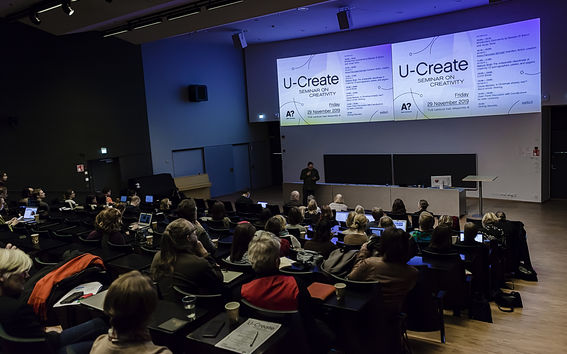
Grand challenges (such as climate crisis, are increasing income inequality, fake news, and strengthening the political power of the technology giants), are discussed every day in politics and the media.
In addition to all of these challenges, we are on the verge of the fourth industrial revolution. When robots and artificial intelligence become more sophisticated, and more and more tasks can be automated, we’ll soon face a question whether there will be enough work for all of us humans. For a different reason, the same question is topical also right now, when coronavirus has had massive implications for the global economy and employment.
The fourth U-CREATE (Creativity, Research, Experimentation, Art, Teaching and Exhibitions) seminar discussed creativity: how to think divergently and to become able to produce radically new solutions. The seminar was held at the end of November 2019, a couple of months before the outburst of the corona pandemic that is currently shaking up the foundations of our societies, health care systems and economies, just to mention a few of its devastating impacts.
These problems require solutions that are different from what we have in place now. What can universities offer to society at the times of disruption?
Modern universities still widely reflect an old paradigm shift called the scientific revolution, which was based on rationalism, analytical geometry and mathematics in the 17th century.
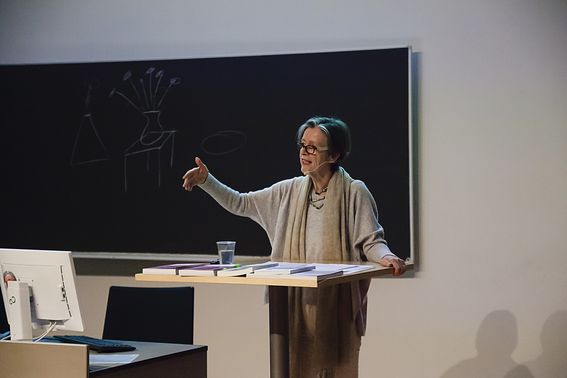
Ursula Bertram, a professor and an artist at the Technical University Dortmund, Germany, was one of the keynotes at the event. During her talk, she pointed out that when the scientific system was established some 400 years ago, it was at a time when people didn’t separate truth from magic and superstition, and thus science needed rational justifications. As a result, everything that wasn’t logical had to leave academia.
Science has indeed since proven to be very successful. A constant flow of technological innovations has improved productivity, medical breakthroughs have lengthened our life spans, and economic growth has reached levels which we couldn’t have fathomed one hundred years ago.
However, any growth has its limits, and human consumption has exceeded the planetary boundaries. There has been wide coverage in the media about the damage of things like fast fashion or the extensive use of concrete as a building material (in rapidly expanding metropolises) is to our planet. We urgently need to concentrate on solutions that offer a change at a systemic level.
For these shifts to occur, we need the creative capability to imagine, develop and test radically different alternatives.
Going beyond the current knowledge
Closed, rational systems, which are based on order, can be weak in navigating within chaos and in the unknown. Bertram posed the question: ‘How can we know what we don’t know?’.
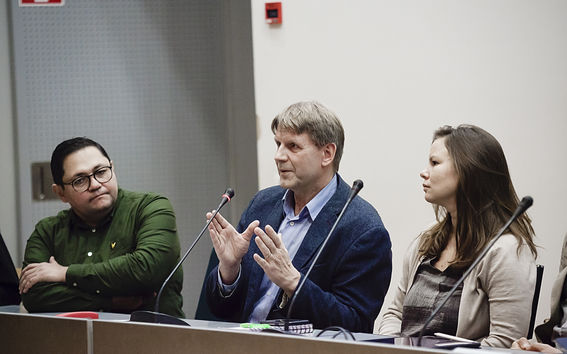
Jouko Lampinen, Dean of Aalto School of Science, reflected in the discussion panel, on how the whole scientific method is a systematic way to falsify or validate ideas; to get evidence on whether a certain idea is supported or not.
‘However, as Bertram said, in science, there is a lot of the unexplainable; things that we don’t understand how they come to be. Where do you get the ideas? Where do the hypotheses come from?’
Lampinen referred to scientific literature in philosophy; for example, Paul Feyerabend and Thomas Kuhn, who have shown that there can be anarchistic or unexplainable creative ways to develop new theories. Kuhn has pointed out that in addition to the normal cumulative progress in science, there are discontinuities, which will change the natural and open new approaches to understanding. Feyerabend has become famous for his rejection of the existence of universal methodological rules.
‘When you go outside the dimensions of current knowledge and into something that’s not like inductive reasoning, it’s not possible to entail knowledge from what you already know. You must come up with something new and then test it. And that requires creativity’, Lampinen says.
Creativity is not a prisoner of art
Bertram defined artistic thinking as non-linear, critical thinking with numerous unknowns. Insecurity and experimental orientation are inherent to this way of working.
‘Let’s be clear: creative artistic thinking is neither a creative technique nor about painting pictures or making sculptures. This is a preconception we must get rid of. Creativity is not a prisoner of art. Rather, artistic thinking can take place anywhere, in any mind, in any discipline, and any area of life. It’s an attitude of turning towards an open, fluid matrix of possibilities’, Bertram explained.
She also emphasized that it takes time to be able to challenge conventions, ‘Creative thinking is not a dress that you can wear, but more like a skin, a pattern, that has to grow together with a person’.
‘Not knowing often makes us afraid, and it takes much more effort’, she said. ‘Our brains want us to stay safe and have routines. Under pressure, our brains become hostile to innovation so departing from safe ground isn’t easy. Transition is like leaving a paradise and finding a new by letting go of custom patterns. Leaving something, rather than creating’.
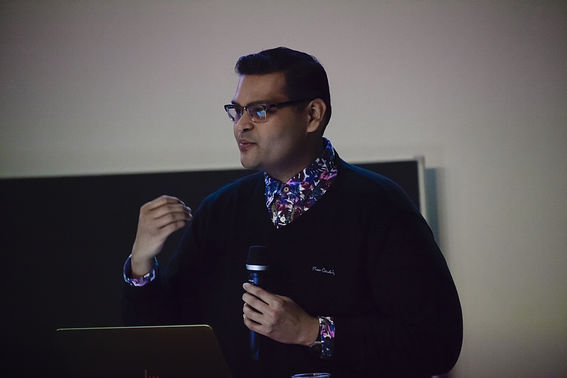
So why are we in need of leaving a paradise then?
Nishant Shah, vice president of research at ArtEZ University in the Netherlands, calls himself a feminist, humanist and technologist, whose work is about understanding the state of misinformation, fakeness, and violence to find new processes of civic action. He pondered that the increasing demand for creativity in businesses and society at large might been seen as a signal of a failure of a system.
Shah discussed that creativity is not just beautiful, but that it also includes an element of destruction that we tend to leave out and forget in our discussions.
‘Sitting in these privileged first-world art institutions and universities, there’s often an inherent problem where we tend to think that the endpoint of creativity is profound human joy and happiness. Contrary to that, the endpoint of creativity should be profound unhappiness, instability and a complete shaking up of a system that’s not working. It’s a force, and like in any other paradigm shift, there’s a terrible sense in a word loss’, Shah emphasised.
‘When creating something new, we ought to let something else go. In that case, we can’t have the same organisational structures that we’re inhabiting right now and be creative’, Shah added.
Language is in the middle of thinking and creation
So, creativity can lead to destruction. But how can we then start building up new, better systems? Thinking involves language, which has limitations of which we must become aware.
Bertram explained that words are not the main emphasis in artistic thinking, and thus, talking about artistic thinking and creativity is a paradox; it’s like trying to describe an open system which refuses a pattern.
‘Talking theoretically about artistic thinking doesn’t give birth to my subject because its habitat is a personal experience, not a written theory. If it’s my experience that I am telling you about, the experience changes into knowledge’.
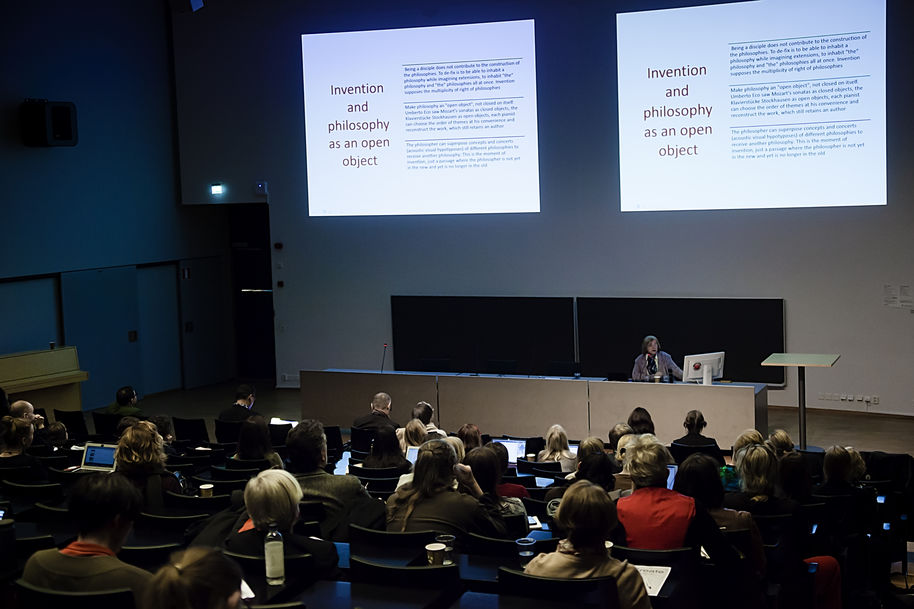
For philosophy, creativity also poses challenges in language. French philosopher Ann-Francois Schmid has, over the years, been one of the key scholars in making transdisciplinarity a popular topic among philosophy. In her keynote talk, Schmid emphasised the need for new, “de-disciplined” knowledge.
Schmid argued that language is in the middle of creation, and when, in real life, we create something novel, different terminology among different disciplines can become an obstacle of understanding.
Shah also pointed out that digitalisation is built on language-based models,‘Because code is a language; it means that digitalisation is an expression of a language. Which necessarily means that there are building blocks, and we can question the implicit biases of these languages’.
Shah is worried that the current internet is a very patriarchal and unequal system, which is not designed to improve the life of people. Still, it reinforces hierarchies, control and power, and thus it doesn’t protect minorities. In India, an explosion of false information and fake news via Whatsapp has provoked anger and violence and has led to more than 40 deaths between 2017 and 2018.
‘One of my projects is to design a new feminist internet, changing the parameters to imagine a different kind of internet because we shouldn’t use creativity for improving a system that has failed, but to dismantle and re-engineer the system. We’d need all of the schools coming together to think that another future is possible, as opposed to just extending what we have’.
Role of humanities and ethics in the age of digitalization
Is there a way to avoid algorithmic anxiety? Shah sees that feminism already has the answer.
‘The first thing to do is to replace value generation by care generation. This draws me to what Ann-Francoise Schmid was saying: begin with ethics, not with the discipline. Because ethics is where care exists’.
Schmid talked about ethics as “a science of boundaries”, and ethics becomes essential and visible when we make difficult decisions. For example, the corona crisis has forced governments to justify their choices and priorities.
Shah’s explanation of care resembles responsibility, ‘If you take a humanistic perspective to creativity and creation, you don’t only look at the final product, but everybody who is affected by the creation. Don’t just look at technological creativity that shows an image of a person on Instagram, but also think about the cleaners of Instagram, those who sit in Philippines and Cambodia removing dirty, harmful and violent content.’
‘Digital systems are strange. We create systems of harm, and then we step back and say, what shall we do to make them stop harming us’.
Shah suggests that the other way would be to start “engineering care”; putting care as a non-negotiable discipline. He continues that care is different from love; love is reciprocal, whereas care is a one-way vector.
‘This is a different kind of a value system, which we don’t necessarily integrate into our conversations around creativity today. How do we bring that back into the conversation is at least my way out so that I don’t get paralysed by fear or algorithmic anxiety’.
Based on the U-Create discussions, the incapacity of any one discipline alone to address and understand the complex problems we face today means that we need new ways to find things we don't yet know.
To be better able to navigate the unknown, universities – but also societies, individuals and businesses – need to intentionally develop creative and empathetic capabilities which will help to imagine, develop and test radically different and responsible alternatives that exceed disciplinary and organizational boundaries.
Watch the talks here:
U-Create Seminar on Creativity 2019
What is the significance and future of creativity across society, industry and academia?
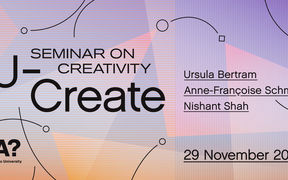
Read more news

Apply Now: Unite! Visiting Professorships at TU Graz
TU Graz, Austria, invites experienced postdoctoral researchers to apply for two fully funded visiting professorships. The deadline for expressions of interest is 20 February 2026, and the positions will begin on 1 October 2026.
Stop applying for jobs and build your own startup instead at Ignite
Applications for the Ignite summer accelerator program 2026 are open. Apply by March 8.Soil Laboratory Exhibition – Exploring the Dialogue Between Human and the Earth in Utsjoki
Soil Laboratory explores the relationship between humans and the earth as a living landscape through ceramic practices in Utsjoki.






